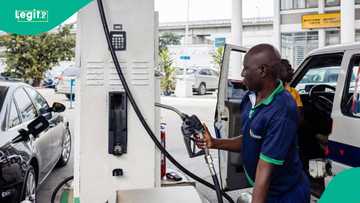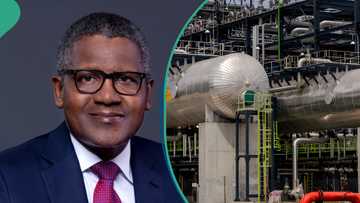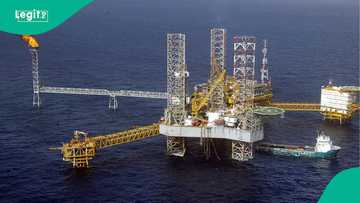FG Takes Bold Decision, Suspends 15% Import Duty on Petrol, Diesel, Experts Predict Price Crash
- The Nigerian government has caved in and suspended the controversial 15% import duty on petrol and diesel
- The Nigerian Midstream and Downstream Petroleum Regulatory Authority (NMDPRA) announced the suspension on social media
- The policy, which commenced in October, generated a lot of controversy with importers warning of higher fuel prices
Pascal Oparada is a journalist with Legit.ng, covering technology, energy, stocks, investment, and the economy for over a decade.
The Federal Government has suspended the planned 15% import duty on Premium Motor Spirit (PMS) and Automotive Gas Oil (Diesel), a decision experts say could ease fuel prices across Nigeria.
The Nigerian Midstream and Downstream Petroleum Regulatory Authority (NMDPRA) confirmed this in a statement posted on its official X handle on Thursday, November 2025.

Source: Facebook
Background: Tinubu’s earlier approval drew criticism
George Ene-Ita, the director of the Public Affairs Department at the NMDPRA, stated:
“It should also be noted that the implementation of the 15 per cent ad-valorem import duty on imported Premium Motor Spirit and Diesel is no longer in view.”
Earlier, President Bola Tinubu had approved the introduction of a 15% ad-valorem import duty on petrol and diesel.
The policy triggered widespread concern from depot owners and fuel marketers, who warned that petrol prices could exceed N1,000 per litre if implemented.
Many operators argued that the duty would make imports unprofitable, especially as the Dangote Refinery’s lower prices continue to dominate the market.
NMDPRA assures of adequate fuel supply
In its statement, the NMDPRA assured Nigerians that there is no shortage of petroleum products nationwide. The authority emphasized that both local refineries and importers have maintained a robust domestic supply to meet peak demand during the festive period.
“There is a robust domestic supply of petroleum products (AGO, PMS, LPG, etc.) sourced from both local refineries and importation to ensure timely replenishment of stocks,” it said.
The agency cautioned against hoarding, panic buying, or speculative price hikes, warning that it will take regulatory action to prevent market disruptions.
Experts predict short-term relief in fuel prices
Industry experts predict that the suspension of the import duty could trigger a temporary crash in petrol and diesel prices, especially as market competition intensifies between Dangote Refinery and importers.

Read also
Dangote Refinery incessant price slash forces halt in petrol imports, marketers device new strategy
Clement Isong, Executive Secretary of the Major Oil Marketers Association of Nigeria (MOMAN), said Dangote’s new pricing model is already changing the dynamics of fuel imports.
“It would stop imports now, definitely, since imports are higher than Dangote’s price. That is the logical thing,” Isong told The PUNCH.
He added that the refinery’s pricing reflects import parity, taking into account global crude oil prices, freight, and logistics — giving it a competitive edge over imported products.
What’s ahead for consumers?
With the suspension of the 15% import duty, Nigerians could soon see a drop in fuel prices as supply remains steady and market pressure eases.

Source: Getty Images
The decision marks a significant policy reversal by the Tinubu administration amid growing public and industry outcry.
Dangote Refinery increases petrol prices
Legit.ng earlier reported that barely days after Nigerians celebrated a major petrol price cut to ₦828 per litre, the Dangote Petroleum Refinery reversed course, increasing its ex-depot price by ₦32.
The new rate now stands at ₦860 per litre, according to data from PetroleumPriceNG.

Read also
Relief for Nigerians as Dangote Refinery slashes petrol price to ₦828 per litre, marketers react
Industry experts warn that petrol prices in Nigeria’s deregulated market remain highly volatile, driven by global crude fluctuations and exchange rate pressures.
Proofreading by Kola Muhammed, copy editor at Legit.ng.
Source: Legit.ng


